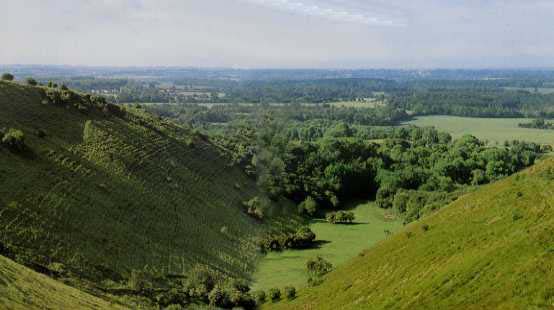Difference between revisions of "Mr Clevvers Roaling Place"
From Riddley Walker Annotations
Eli Bishop (talk | contribs) |
Eli Bishop (talk | contribs) |
||
| Line 1: | Line 1: | ||
| − | [[File:Trough.jpg|thumb| | + | [[File:Trough.jpg|frame|thumb|420x235px|right|link=]] |
| − | This is what is now called the '''Devil's Kneading Trough''', in the [[How|Wye]] Downs. It is a combe (or coombe—originally a Welsh word, ''cwm''), carved out of the chalk hills by the flow of mud and water as the ground froze and thawed during a glacial period. But, as with [http://www.unmuseum.org/devtowergeo.htm other] [http://www.aypwip.net/germany/03Teufelstisch.html dramatic] [http://geology.utah.gov/surveynotes/geosights/devilsslide.htm rock] [http://rainton.com/fun/australia/jes_outback/?page=devils_marbles formations] around the world, it's natural to suspect that it was sculpted by someone with a strange sense of humor. | + | This is what is now called the '''Devil's Kneading Trough''', in the [[How|Wye]] Downs. It is a combe (or coombe—originally a Welsh word, ''cwm''), carved out of the chalk hills by the flow of mud and water as the ground froze and thawed during a glacial period. But, as with [http://www.unmuseum.org/devtowergeo.htm other] [http://www.aypwip.net/germany/03Teufelstisch.html dramatic] [http://geology.utah.gov/surveynotes/geosights/devilsslide.htm rock] [http://rainton.com/fun/australia/jes_outback/?page=devils_marbles formations] around the world, it's natural to suspect that it was sculpted by someone with a strange sense of humor. Photo by {{By|BJB}}. |
''(27, {{Ixp|113|35}}-114)'' | ''(27, {{Ixp|113|35}}-114)'' | ||
Revision as of 00:41, 4 December 2013

thumb
This is what is now called the Devil's Kneading Trough, in the Wye Downs. It is a combe (or coombe—originally a Welsh word, cwm), carved out of the chalk hills by the flow of mud and water as the ground froze and thawed during a glacial period. But, as with other dramatic rock formations around the world, it's natural to suspect that it was sculpted by someone with a strange sense of humor. Photo by BJB.
(27, 113-114)